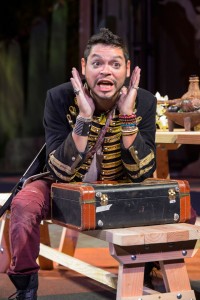TO UPDATE OR NOT UPDATE: THAT IS THE QUESTION
If, as described in its publicity, Cal Shakes’ A Winter’s Tale takes viewers through “a Narnia-esque door to fantastical lands” to fulfill the Bard’s vision of “a family-friendly fairy tale featuring music, miracles, dance, audience participation,” then this production succeeds – fully and satisfyingly realizing Shakespeare’s gifts for comedy and tragedy via superlative acting and innovative staging. It truly is “Shakespeare’s love letter to the art of story.”
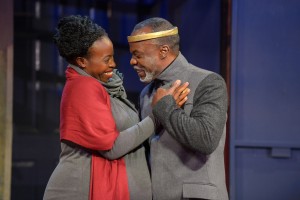 It all begins with a fantastical, magical tone set by actors cavorting about singing a welcoming ditty, like players in true Renaissance style, and the production fulfills the promise the tone implies. Costume designer Katherine Nowacki’s stark costume contrasts leave no doubt as to the story’s shifts, from sophisticated and somber grey in a first act of tragedy to contemporary, loose-flowing, playfully colorful duds in a mirthful second act. On a spacious stage, actors make full use of Michael Locher’s colorful, versatile, and three-dimensional set which is rife with surprising elements. They also romp up and down the aisles in the house to snatch up viewers to use in the show.
It all begins with a fantastical, magical tone set by actors cavorting about singing a welcoming ditty, like players in true Renaissance style, and the production fulfills the promise the tone implies. Costume designer Katherine Nowacki’s stark costume contrasts leave no doubt as to the story’s shifts, from sophisticated and somber grey in a first act of tragedy to contemporary, loose-flowing, playfully colorful duds in a mirthful second act. On a spacious stage, actors make full use of Michael Locher’s colorful, versatile, and three-dimensional set which is rife with surprising elements. They also romp up and down the aisles in the house to snatch up viewers to use in the show.
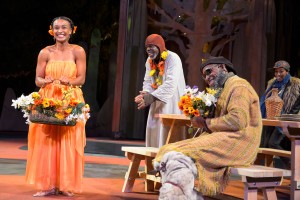 Sicilian ruler Leontes (L. Peter Callender) accuses his wife Hermione (Omoze Idehenre) of philandering with Bohemian ruler Polixenes (Aldo Billingslea). Deaf to her horrified astonishment at his slanders, he sentences her to death and orders her newborn “bastard” daughter left out in the woods to face her fate. But tragedy adroitly slips into a happy ending as the baby is discovered in snowy woods by a goofily sweet shepherd (Callender). The baby grows to charming womanhood and falls in love. In true Bard style, the relationship of parent and child, the whimsies of love and fate, and the juxtaposition of life are all explored, while pointed commentary is made clear.
Sicilian ruler Leontes (L. Peter Callender) accuses his wife Hermione (Omoze Idehenre) of philandering with Bohemian ruler Polixenes (Aldo Billingslea). Deaf to her horrified astonishment at his slanders, he sentences her to death and orders her newborn “bastard” daughter left out in the woods to face her fate. But tragedy adroitly slips into a happy ending as the baby is discovered in snowy woods by a goofily sweet shepherd (Callender). The baby grows to charming womanhood and falls in love. In true Bard style, the relationship of parent and child, the whimsies of love and fate, and the juxtaposition of life are all explored, while pointed commentary is made clear.
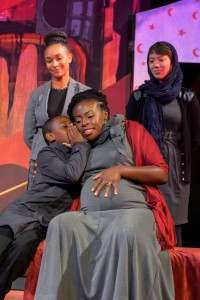 Director Patricia McGregor unleashes her engrossing actors, allowing them to build character and discover authentic emotion. As such, the ensemble nailed the heart-rending drama in Act I and offered spot-on comic timing in Act II. It seems that unrestrained interpretation of the Bard has become an honored theatrical tradition, and it certainly takes place here, and I did enjoy the lighthearted tone that rolled into the second half, as characters made fun of the play and sometimes of each other. Yet while the innovations used to modernize Shakespeare are certainly appreciated, I noted an uncomfortable down side: The shifts from classical Shakespeare to modern devices such as cellphones, electric guitars and rap seemed a little rocky. The rainbow of musical styles, coursing from hip-hop to chanting (depicting the oracle of Apollo) to Christopher Michael Rivera’s pumped-up rock may be excellently presented, but it distracted my concentration on the story. Still, I warrant that some viewers might consider modern devices as an effective way to underscore the play’s versatility, and make it more fun and accessible.
Director Patricia McGregor unleashes her engrossing actors, allowing them to build character and discover authentic emotion. As such, the ensemble nailed the heart-rending drama in Act I and offered spot-on comic timing in Act II. It seems that unrestrained interpretation of the Bard has become an honored theatrical tradition, and it certainly takes place here, and I did enjoy the lighthearted tone that rolled into the second half, as characters made fun of the play and sometimes of each other. Yet while the innovations used to modernize Shakespeare are certainly appreciated, I noted an uncomfortable down side: The shifts from classical Shakespeare to modern devices such as cellphones, electric guitars and rap seemed a little rocky. The rainbow of musical styles, coursing from hip-hop to chanting (depicting the oracle of Apollo) to Christopher Michael Rivera’s pumped-up rock may be excellently presented, but it distracted my concentration on the story. Still, I warrant that some viewers might consider modern devices as an effective way to underscore the play’s versatility, and make it more fun and accessible.
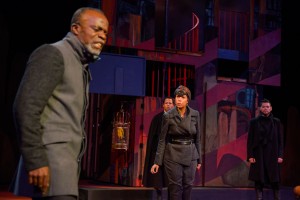 The acting was an inarguable upside. Callender commands the stage as a king caught up in delusion and then he is poignant when remorse catches up with him. Later, Callender becomes a delightful master of comedy as the shepherd. Idehenre beautifully nails pathos with queenly dignity as Hermione protests her innocence, and then turns in a joyously girlish character in the second act. Also well worth watching was Margo Hall as acid-tongued Paulina chewing out Leontes in the first scenario and then drawing guffaws with her clowning and portrayal as the shepherd’s son in the second half.
The acting was an inarguable upside. Callender commands the stage as a king caught up in delusion and then he is poignant when remorse catches up with him. Later, Callender becomes a delightful master of comedy as the shepherd. Idehenre beautifully nails pathos with queenly dignity as Hermione protests her innocence, and then turns in a joyously girlish character in the second act. Also well worth watching was Margo Hall as acid-tongued Paulina chewing out Leontes in the first scenario and then drawing guffaws with her clowning and portrayal as the shepherd’s son in the second half.
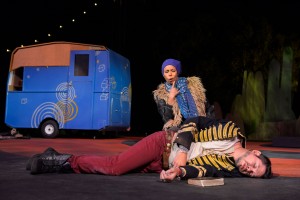 Tristan Cunningham as grown daughter Perdita is winsome, wholesome and altogether appealing, and Tyee Tilghman as Polixenes’ son and her suitor is sincere. The actors here play multiple roles and consequently it is just a little confusing that Tilghman also appears as Leontes’ advisor Camillo. Rivera is stunningly versatile as he shifts from a sincere Autolycus to a guitar-wielding fast-talker. The audience participation seemed a bit contrived in spots, though it did promote connection with the production and allowed the actors to define their characters with a little more immediacy.
Tristan Cunningham as grown daughter Perdita is winsome, wholesome and altogether appealing, and Tyee Tilghman as Polixenes’ son and her suitor is sincere. The actors here play multiple roles and consequently it is just a little confusing that Tilghman also appears as Leontes’ advisor Camillo. Rivera is stunningly versatile as he shifts from a sincere Autolycus to a guitar-wielding fast-talker. The audience participation seemed a bit contrived in spots, though it did promote connection with the production and allowed the actors to define their characters with a little more immediacy.
If you’re open-minded as to how you like your Shakespeare, A Winter’s Tale offers the twists and turns worthy of true storytelling; the show was engrossing even on the blustery opening night (you can rent blankets for evening chill). Plus, Cal Shakes’ newly renovated and comfortable Bruns Amphitheater is a delightful venue, and truly an East Bay gem.
A Winter’s Tale
California Shakespeare Theater in Orinda
scheduled to end on October 20, 2013
for tickets, call 510.548.9666
or visit http://www.calshakes.org/
